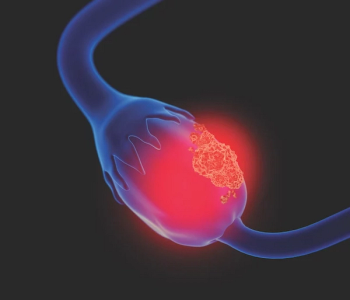
Ovarian Cancer
Latest News

Latest Videos

CME Content
More News

Drs Bradley J. Monk, Sarah Hayward, and Jennifer MacDonald comment on monitoring and managing adverse events with PARP inhibitor therapy in patients with ovarian cancer in the frontline maintenance setting.

Bradley J. Monk, MD, FACS, FACOG, and Jennifer MacDonald, PharmD, BCOP, share insight on improving outcomes and optimizing therapy with PARP inhibitors in the frontline maintenance setting for ovarian cancer.

Olaparib was the first PARP inhibitor to be developed and has been the most studied.

The new sFIS assay may be capable of identifying immune biomarkers indicative of survival chances and treatment effectiveness for patients with ovarian cancer.

Study finds that 16.9% of stomach cancers, 11.9% of endometrial cancers, 11.0% of kidney cancers, 9.3% of colon cancers, 8.1% of esophageal cancers, 6.5% of female breast cancers, and 3.9% of urinary bladder cancers were associated with a low level of exercise.

Bhavesh Shah, RPh, BCOP, and Thomasina Morris, RPh, MHA, BCOP, discuss toxicities to monitor for when using PARP inhibitors to battle ovarian cancer.

The drug previously received approval to treat mucosal melanoma but could be used in combination with pembrolizumab.

Bhavesh Shah, RPh, BCOP, reviews data and results from the ARIEL3 trial that studied the PARP inhibitor, rucaparib, for the management of ovarian cancer.

Bhavesh Shah, RPh, BCOP; and Thomasina Morris, RPh, MHA, BCOP, detail what makes a patient eligible to receive PARP inhibitors as second-line maintenance for the management of ovarian cancer.

There are 3 PARP inhibitors that are FDA approved in multiple settings of ovarian cancer.

Two board-certified oncology pharmacists review the importance of PARP inhibitors for second-line maintenance in treating ovarian cancer.

Bhavesh Shah, RPh, BCOP; and Thomasina Morris, RPh, MHA, BCOP, discuss the mechanism of action and efficacy for the 3 PARP inhibitors used to treat patients with ovarian cancer: olaparib, rucaparib, and niraparib.

Bhavesh Shah, RPh, BCOP, provides a brief history of PARP inhibitors in the cancer space, as well as his own introduction to PARP inhibitors.

STRO-002 is a folate receptor alpha-targeting antibody drug conjugate for the treatment of patients with platinum-resistant epithelial ovarian, fallopian tube, or primary peritoneal cancer who have received 1 to 3 prior lines of systemic therapy.

The designation highlights the need for new treatment options for patients with platinum-resistant ovarian cancer and the significant treatment potential of IN10018, according to a press release from InxMed, the manufacturer of the novel drug.

The OVATION 2 study combines GEN-1 with standard-of-care neoadjuvant chemotherapy (NACT) in patients newly diagnosed with stage 3 and 4 ovarian cancer.

Oncologist Susan Miesfeldt, MD, of MaineHealth, discussed the importance of genetic testing and counseling for breast and ovarian cancers as well as barriers that must be addressed in order to reach more patients eligible for these services.

This discovery could enhance efforts to develop better treatments for breast, ovarian, and prostate cancer.

Olaparib and niraparib both show promise in the maintenance treatment of ovarian cancer, though they may each be appropriate for different patient populations.

The safety profile was consistent with the profiles associated with each drug as a monotherapy, with no clinically significant drug-drug interactions observed with the combination.

Study indicates patients with ovarian cancer frequently receive aggressive end-of-life care despite industry guidelines that emphasize quality of life for those with advanced disease.

Guidelines typically recommend debulking surgery, plus systemic chemotherapy for most patients.

The company received Fast Track designation from the FDA for GEN-1, a DNA-mediated interleukin-12 (IL-12) immunotherapy.

The FDA has granted a fast track designation to the DNA-mediated interleukin-12 immunotherapy GEN-1 for use in the treatment of patients with advanced ovarian cancer.

Rucaparib is an oral, small molecule inhibitor being developed in multiple tumor types, including ovarian and metastatic castration-resistant prostate cancers.





























